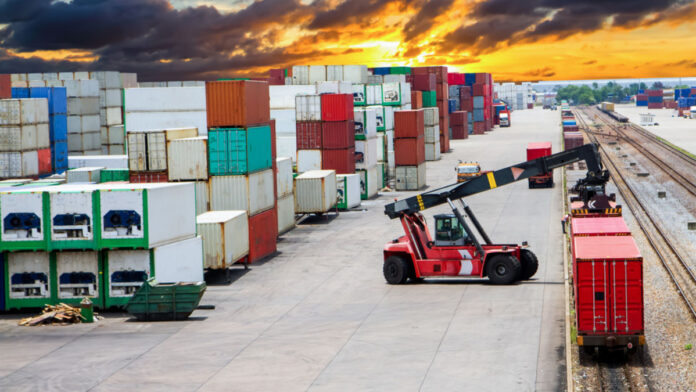NEW DELHI, June 11
As India rises in economic prominence, its ability to capitalise on its potential as a global manufacturing and supply chain hub, arising from geopolitical realignment and government support, hinges on redefining its logistics narrative with a technologically adept workforce.
India – poised to become the world’s third-largest economy by 2027-28 per the IMF – has also evolved to being a key global influencer. Notable achievements, such as a successful moon mission and hosting of the G20 Summit, underscore its growing prominence on the international stage. As the nation expands its global footprint, it is increasingly being recognised as an important global supply chain and manufacturing hub, especially amid geopolitical conflicts that are nudging Companies to diversify their sourcing. Seizing this opportunity depends on India’s ability to deploy a technologically skilled workforce for smart logistics, utilising technologies such as Artificial Intelligence (AI), Machine Learning (ML), Internet of Things (IoT), Robotics to quickly and efficiently streamline processes and minimise manual labour.
Unleashing Logistics Excellence
Research indicates that the global smart logistics market, currently valued at US$30.5 billion, is expected to reach US$201 billion by 2032, with a projected 20.7% CAGR over the next decade. Increasing digitisation, smart technology adoption, e-commerce growth, and the implementation of smart transportation systems contribute to this surge. India, with various advantageous factors in play, can strategically deploy smart talent to advance its logistics sector in the midst of this global digitisation trend.
Young and tech-savvy workforce
Despite its historical association with physically demanding roles and outdated systems, India’s logistics sector can undergo a revival through its technological expertise and adaptable workforce. Securing the top spot in ‘AI talent concentration’ among 131 countries on the Network Readiness Index 2022 highlights India’s preparedness for this transformative journey. Additionally, India’s youthful and tech-savvy workforce provides a substantial advantage over the labour force in the logistics industry, distinguishing it from developed economies, which face a skill shortage due to an aging workforce.
Government initiatives
In response to the evolving supply chain landscape, the Indian government has introduced strategic initiatives like the National Logistics Policy. This policy promises a revitalised industry with not just improved technology, infrastructure, reduced costs, but comprehensive training programs and an re-skilled workforce. The PM’s National Master Plan – Gati Shakti further emphasises the commitment to workforce upskilling, ensuring India remains future-ready in logistics.
Industry-academia collaboration In India, collaborative efforts between industry leaders and educational institutes are fast-tracking progress in smart logistics talent development. Specialised logistics programs focusing on advanced technologies, offered by leading B-Schools, are attracting young professionals eager to contribute to the evolving supply chain landscape. The inclusion of smart logistics courses in technical institutes is also playing a pivotal role in making India a hub for a technologically skilled logistics workforce.
Technology-driven green logistics
As customer preferences shift towards sustainable practices in logistics, green talent finds a unique opportunity. With data-driven decision-making, logistics companies can reduce empty miles, minimising emissions. In response to global demands and India’s commitment to net-zero emissions by 2070, Indian logistics firms are actively investing in zero-carbon transportation. This includes the use of drones for last-mile delivery and AI-driven route optimisation, presenting a growing space for individuals skilled in green logistics solutions.
Inclusion & diversity
Amidst promising prospects, the logistics sector in India stands poised to unlock a wealth of top-tier smart talent by actively tapping into the underrepresented demographic of women. Traditionally marginalised in this field, women have seen a noteworthy increase in their employment, rising from a mere 8-10% to a commendable 20-25% over the past 10-12 years, due to digitisation and automation of the sector This surge not only signifies a positive shift towards gender inclusivity but also serves as a strategic move to enrich the smart logistics workforce pool with diverse perspectives and skill sets.
E-commerce boom
Morgan Stanley predicts India’s e-commerce market will increase to $200 billion by 2027, driven by the rise of offline to online models. Logistics companies in India are gearing up to meet the growing demands of this evolving, highly customer-centric e-commerce landscape. Supporting this trend, intelligent logistics are poised to boost e-commerce supply chains by improving demand forecasting, automating order fulfilment, enhancing last-mile delivery, streamlining procurement, and providing end-to-end visibility. This highlights the need for cultivating smart logistics talent to innovate and meet the needs of India’s flourishing e-commerce market.
Compliance & security
Logistics firms, adjusting to stringent and complex industry regulations, require experts in compliance and risk management. Smart talent ensures adherence through advanced systems, real-time monitoring, and data analytics. With the rise in cyberattacks on logistics companies, the industry needs smart talent adept in the latest cybersecurity solutions.
Driving smart logistics
Digital Transformation has deeply penetrated the sector. According to S&P Global Market Intelligence’s Supply Chain Digital Transformation Enterprise Survey 2023, nearly two-thirds of logistics and transportation organisations “have a digital transformation plan in place, but are in need of technology leadership skills”.
In this era of smart logistics, where efficiency and innovation are paramount, smart talent emerges as the catalyst for India’s smart logistics revolution. As the country advances on its path to global economic prominence, the confluence of technological breakthroughs, government support, and the China plus One strategy, bolstered by the prowess of this smart talent, could also position India as a trailblazer in defining the future of smart logistics worldwide.



























